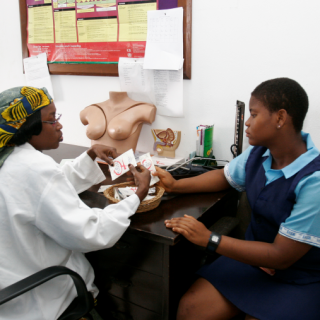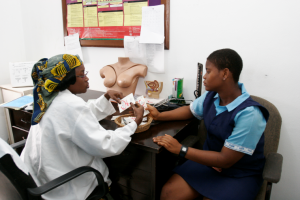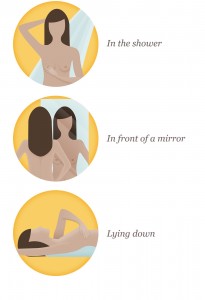You may have heard about an incidence of rape, or even know someone who has experienced it. However, the way you responded to the situation might have been a little tainted by your preconceived notions of what rape is or is not, who or who should not be raped, where it happens and other ideas.
As correct as your ideas or what you are told may seem, they might be based on some of the many myths and misconceptions that exist in our society. These myths often create problems for the victim, the victim’s family, law enforcement agencies, hospital and medical personnel, and society in general. Accepting these false beliefs about rape does not only hurt the victims, but also opens you up to the danger of becoming a victim because of your limited understanding.
The following are some common myths about rape. Please keep in mind that they are ALL FALSE.
• Anyone could prevent rape if she really wanted to. No woman can be raped against her will.
• Rapists are easy to spot. They are abnormal perverts. Only insane men rape women.
• Rape is an impulsive act, an uncontrollable act of sexual gratification.
• If a woman has consented to sexual relations in the past with a man, she cannot be raped by that man in the future.
• Some women deserve to be raped because of the way they dress, act, etc. They cause a man to “lose control.”
• Women say “NO” when they really mean “YES”.
• Rape is no big deal if the woman has had sex previously.
Again I repeat that these are ALL FALSE.
So, lets explore 7 of these myths and existing facts that debunk them in more detail
Myths and Facts about Rape
Myth 1: “It can’t happen to me.” Rape is an isolated, rare event that only happens to certain kinds of people like attractive ladies or those who are promiscuous or provocative.
Fact: Anyone can be raped or sexually assaulted. Media reports about rape show a wide range of victims including infants, adolescents, elderly people, people who are physically challenged etc. These people also have different ethnic, religious, economic and social backgrounds. So it is not limited to a certain group of people. According to the Nigerian Police, a total of 1,952 cases were reported in 2009 and 678 cases were reported in Lagos between March 2012 – 2013.
Also, do note that attracting attention is not an invitation to rape!
Myth 2: Men don’t get raped.
Fact: Wrong! In the majority of rape cases, the male is the offender and the female is the victim. However, men and boys are raped too. Men can be raped by other men and women can also coerce or pressure men or boys into performing sexual acts that they do not desire. Also, research has found that between 1 out of 4 and 1 out of 7 male children are sexually abused.
Myth 3: Girls are raped because of what they wear.
Fact: False! No one ever asks to be raped.
People can be raped even when they are modestly dressed. A person who rapes others does not respect any boundaries, taking what he/ she wants no matter what the victim is wearing. The number one thing convicted rapists report looking for in a victim is vulnerability, not appearance. Also, rape is not a crime motivated by sexual gratification, but by power and violence. No one has the “right” to another person’s body or to force others into an act against their will. A woman always has the right to say no and not to be raped. This myth only takes the responsibility of the rape away from the rapist and shifts it to the victim.
Myth 4: Girls usually say ‘No’ when they mean ‘Yes’.
Fact: Wrong! Nobody wants to be physically hurt, humiliated or degraded. They mean to say ‘no’ but have not been taught that it is acceptable to say ‘no’ to a person of authority or an older person. Although a man may believe he is receiving mixed messages, this is no excuse for rape.
When a woman says “no”, no one should never assume that “no” means anything else but “no”.
Myth 5: Some people get pleasure from being raped.
Fact: Never! The victim is in terror. Anyone who thinks it is possible to enjoy rape does not understand the nature of this terrible violation of human rights. Rape is a brutal, terrorizing, humiliating experience often involving serious injury and trauma that no one could ever want or ask for. Rape is a crime of violence.
Myth 6: People who don’t actually fight back physically have not been sexually assaulted.
Fact: A person might not fight back for any number of reasons; including feeling it is not safe to do so. This does not mean that the victim is giving consent. No one asks to be sexually assaulted. Nor does anyone’s behavior justify or excuse the crime. People have a right to be safe from a sexual violation at any time, any place and under any circumstances. The offender, not the survivor, must be held responsible for this crime.
Myth 7: The best way for survivors to get over rape is to act like it didn’t happen, to put it behind them, get on with their lives and be “normal” again.
Fact: Speaking out about rape might be an essential part of the recovery process for survivors. However, no survivor should ever be forced to speak, publicly or privately, before they are ready. Every survivor is the expert on their own recovery. For many, recovery becomes an ongoing process of healing, change and empowerment. All survivors have a right to support and validation from friends, family and service providers, no matter where they are in their individual healing process or how long ago the assault occurred.
Together we can stop rape in our own way if we desist from believing these myths and encourage others not to believe them too. Remember that no one ever asks to be raped because it is a traumatic and devastating experience.






You must be logged in to post a comment.